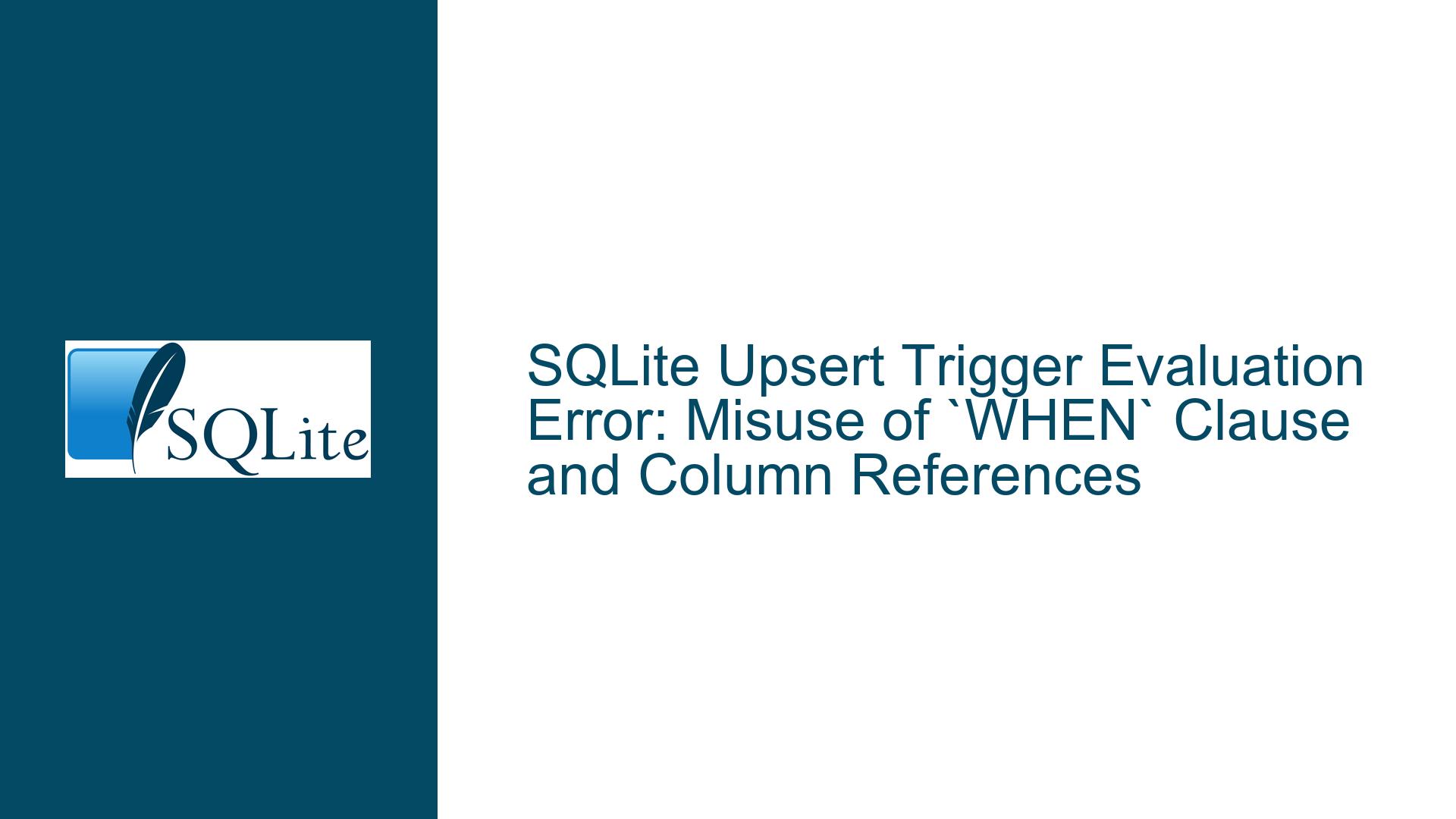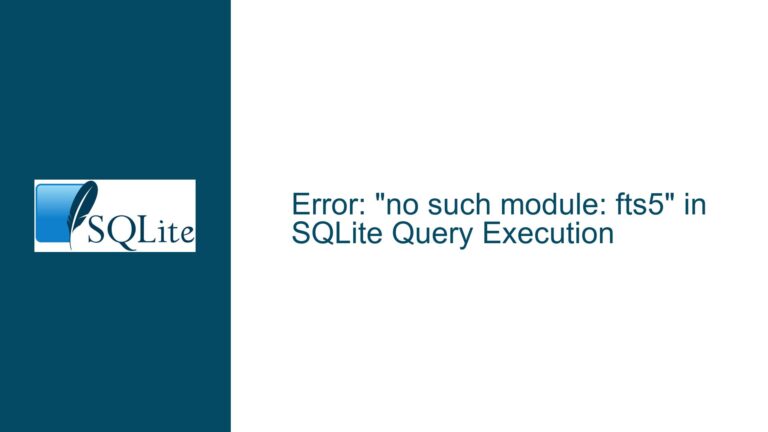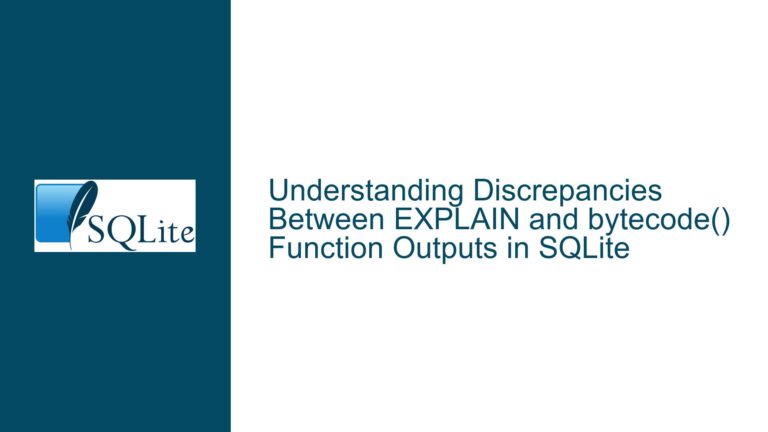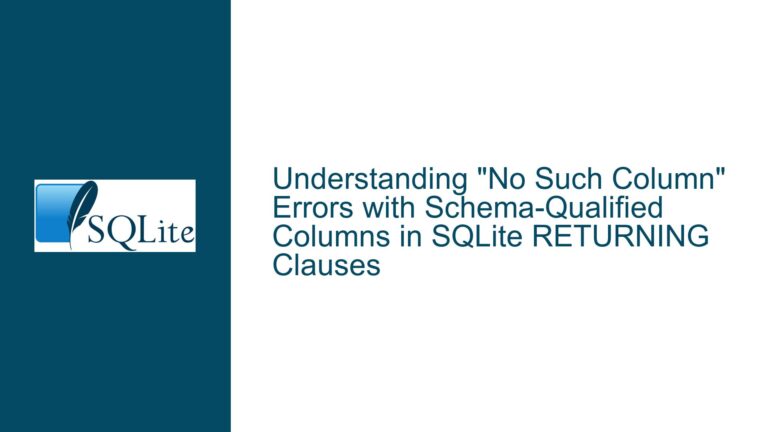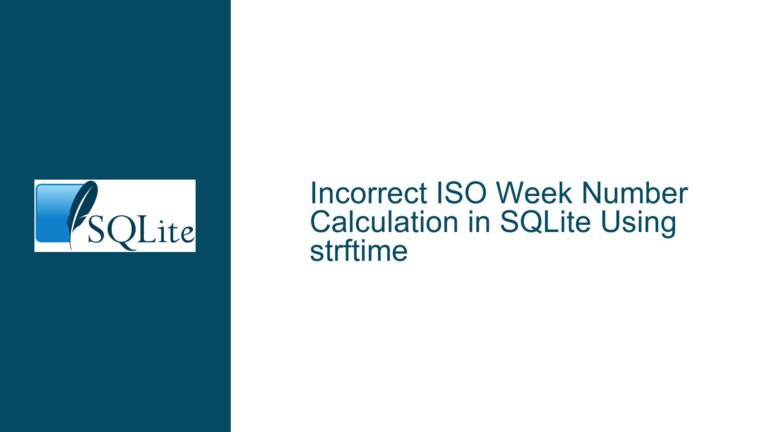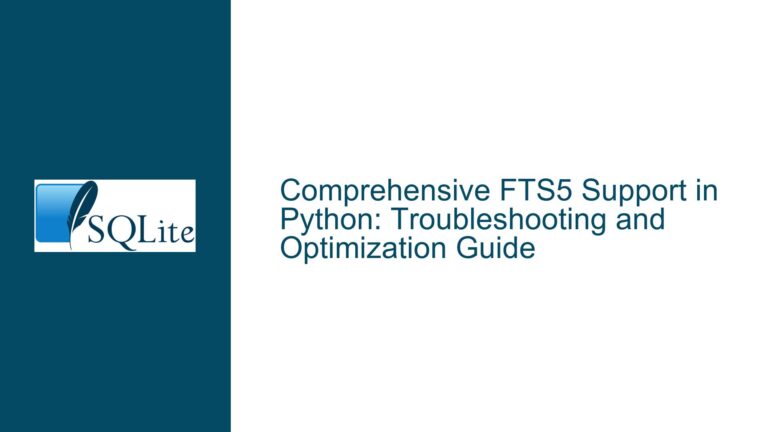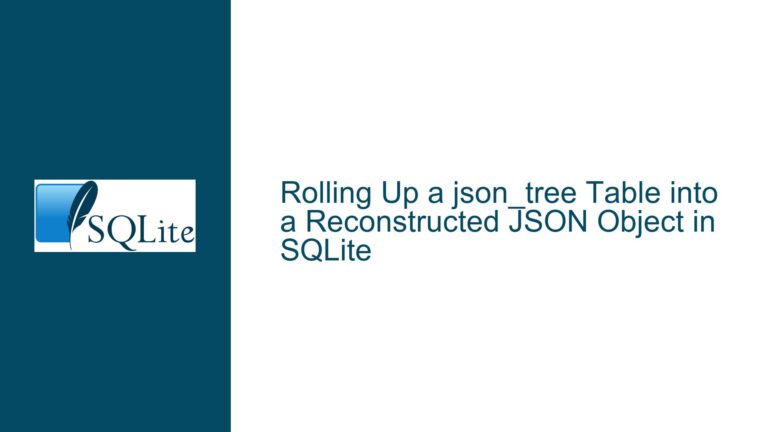SQLite Upsert Trigger Evaluation Error: Misuse of `WHEN` Clause and Column References
SQLite Trigger Evaluation During Upsert Without Conflict
The core issue revolves around the unexpected evaluation of an AFTER UPDATE trigger’s WHEN clause during an INSERT ... ON CONFLICT DO UPDATE (upsert) operation in SQLite, even when no conflict occurs. The trigger is designed to enforce a business rule—ensuring that an item’s name is always uppercase—but it fails due to a misconfiguration in the WHEN clause and improper column references. Specifically, the error Error: no such column: name occurs during the preparation of the SQL statement, indicating that the trigger is being parsed and evaluated prematurely.
The trigger in question is defined as follows:
CREATE TRIGGER uppercase_name
AFTER UPDATE ON Items
WHEN lower(name) != upper(name)
BEGIN
UPDATE Items SET name = upper(name);
END;
The issue arises because the WHEN clause refers to name without specifying whether it is the old or new value of the column. In SQLite triggers, column references in the WHEN clause must be explicitly qualified as old.column_name or new.column_name to avoid ambiguity. Without this qualification, SQLite cannot resolve the column reference, leading to the error.
Furthermore, the trigger is ill-conceived in its design. It fires on any update to the Items table, regardless of whether the name column is modified. This results in unnecessary evaluations and potential performance issues. Additionally, the trigger updates all rows in the Items table, which is inefficient and can lead to unintended side effects, especially if recursive triggers are enabled.
Misconfigured WHEN Clause and Ambiguous Column References
The primary cause of the error is the misconfigured WHEN clause in the trigger definition. The clause WHEN lower(name) != upper(name) fails to specify whether name refers to the old or new value of the column. In SQLite, triggers have access to both old and new values of the row being modified, but these must be explicitly referenced to avoid ambiguity. The correct reference should be new.name, as the trigger is intended to evaluate the new value of the name column after an update.
Another contributing factor is the improper handling of case sensitivity in the name column. The trigger attempts to enforce uppercase names but does not account for the possibility of case-insensitive comparisons. This can lead to issues when attempting to upsert rows with names that differ only in case. For example, inserting 'apple' and 'Apple' would result in a conflict if the name column is case-sensitive, but the trigger does not handle this scenario correctly.
The trigger also lacks specificity in its action. It updates all rows in the Items table, which is unnecessary and inefficient. The intended behavior should be to update only the row that triggered the update, using a condition such as WHERE rowid = new.rowid. This ensures that the trigger operates only on the relevant row and avoids unintended side effects.
Correcting Trigger Logic and Ensuring Proper Upsert Behavior
To resolve the issue, the trigger must be redefined with proper column references and a more precise action. The corrected trigger definition is as follows:
CREATE TRIGGER uppercase_name
AFTER UPDATE OF name ON Items
WHEN new.name IS NOT upper(new.name)
BEGIN
UPDATE Items SET name = upper(new.name) WHERE rowid = new.rowid;
END;
This trigger definition addresses the following issues:
- Explicit Column References: The
WHENclause now correctly referencesnew.name, eliminating the ambiguity that caused the original error. - Specific Trigger Condition: The trigger fires only when the
namecolumn is updated, reducing unnecessary evaluations. - Precise Update Action: The
UPDATEstatement now includes aWHEREclause to ensure that only the row that triggered the update is modified.
Additionally, to handle case sensitivity correctly, the name column should be defined with a COLLATE NOCASE clause:
CREATE TABLE Items (
name TEXT PRIMARY KEY COLLATE NOCASE
);
This ensures that case-insensitive comparisons are used for the name column, preventing conflicts when upserting rows with names that differ only in case.
Detailed Explanation of the Corrected Trigger
- Trigger Condition: The
WHEN new.name IS NOT upper(new.name)clause ensures that the trigger fires only when the new value of thenamecolumn is not already in uppercase. This prevents unnecessary updates and improves performance. - Trigger Action: The
UPDATE Items SET name = upper(new.name) WHERE rowid = new.rowidstatement updates only the row that triggered the update, avoiding unintended side effects and ensuring efficient operation. - Case Sensitivity Handling: The
COLLATE NOCASEclause in the table definition ensures that case-insensitive comparisons are used for thenamecolumn, preventing conflicts when upserting rows with names that differ only in case.
Testing the Corrected Trigger
To verify the corrected trigger, the following test cases can be used:
Insert a New Row: Insert a row with a lowercase name and verify that the trigger updates it to uppercase.
INSERT INTO Items VALUES ('apple') ON CONFLICT (name) DO UPDATE SET name = excluded.name;The resulting row should have the name
'APPLE'.Update an Existing Row: Update an existing row with a lowercase name and verify that the trigger updates it to uppercase.
UPDATE Items SET name = 'banana' WHERE name = 'APPLE';The resulting row should have the name
'BANANA'.Upsert with Case-Insensitive Conflict: Upsert a row with a name that differs only in case from an existing row and verify that the trigger handles the conflict correctly.
INSERT INTO Items VALUES ('Banana') ON CONFLICT (name) DO UPDATE SET name = excluded.name;The resulting row should have the name
'BANANA', and no conflict should occur.
Performance Considerations
The corrected trigger is more efficient than the original because it fires only when the name column is updated and updates only the relevant row. This reduces unnecessary evaluations and updates, improving performance. Additionally, the use of COLLATE NOCASE ensures that case-insensitive comparisons are used, preventing conflicts and ensuring correct behavior.
Conclusion
The issue with the AFTER UPDATE trigger’s WHEN clause being evaluated during an upsert operation without a conflict is caused by a misconfigured trigger definition and ambiguous column references. By explicitly referencing new.name in the WHEN clause, specifying the trigger condition more precisely, and ensuring case-insensitive comparisons with COLLATE NOCASE, the trigger can be corrected to function as intended. The corrected trigger is more efficient and avoids unintended side effects, ensuring proper upsert behavior in SQLite.
